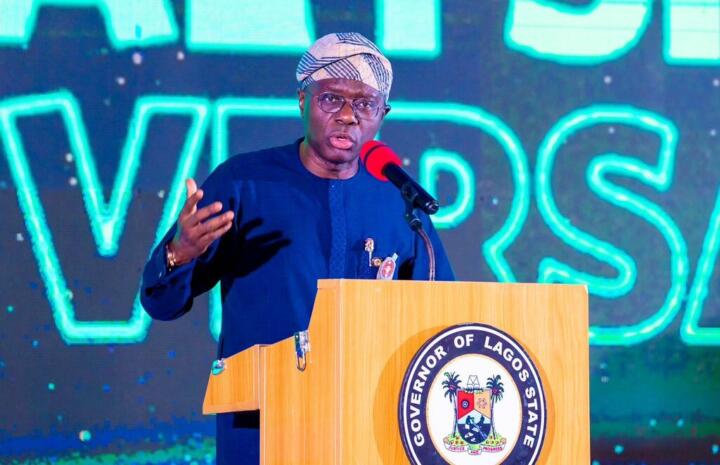Governor Babajide Sanwo-Olu has disclosed that Lagos State lost an estimated ₦19.52 billion to fire incidents in 2024, a staggering figure that reflects the devastating economic and social impact of the disasters on Africa’s largest city. The governor made the disclosure during the commissioning of newly acquired firefighting equipment for the Lagos State Fire and Rescue Service, stressing that while his administration has made huge investments in emergency response capabilities, the frequency and severity of fire outbreaks remain a major concern.
Sanwo-Olu explained that the losses were calculated from the combined cost of damaged properties, destruction of public and private infrastructure, lost goods, and disruptions to economic activities. He lamented that many of the incidents could have been prevented if residents and business owners had adhered strictly to safety regulations. “Our findings reveal that a significant number of these fires were caused by negligence—careless handling of electrical appliances, unsafe storage of flammable materials, illegal electrical connections, and a general disregard for basic safety precautions,” he said.

According to the governor, beyond the monetary value of the losses, the most painful consequence of fire disasters is the loss of lives, displacement of families, and the psychological trauma endured by victims. He emphasised that rebuilding from such tragedies often takes years and that for many small business owners, one fire outbreak can mean the end of their livelihoods. “We can replace buildings and roads, but we cannot bring back lost lives or undo the emotional scars that victims carry,” Sanwo-Olu said.
To tackle the challenge, the Lagos State Government has continued to strengthen its firefighting and disaster management infrastructure. Sanwo-Olu announced that in 2024, the state expanded the operational fleet of the Lagos State Fire and Rescue Service by procuring additional modern fire engines, water tankers, and rapid intervention vehicles. Several fire stations were also upgraded, while new ones are planned for high-density areas to ensure faster response times. He stated that the state has invested in advanced communication and dispatch systems to coordinate emergency responses more efficiently.
The governor further disclosed that hundreds of firefighters had undergone specialised training in both local and international institutions to sharpen their skills in handling various categories of fire incidents. This, he said, is part of a broader strategy to ensure that Lagos remains prepared to tackle emergencies in its fast-growing urban environment.
Sanwo-Olu, however, stressed that government efforts alone cannot solve the problem. He urged residents to take proactive measures by adopting fire prevention habits at home and in workplaces. “Prevention is always better than response. We need to cultivate a culture of safety in our homes, markets, offices, and industrial areas. Every household and business should have basic firefighting equipment like fire extinguishers, smoke detectors, and sand buckets, and everyone should know how to use them,” he advised.
The governor also warned that businesses operating in high-risk environments, such as markets, petrol stations, and manufacturing facilities, must adhere strictly to safety protocols and undergo regular inspections. He revealed that the state would intensify enforcement of fire safety laws, including the closure of premises that fail to comply with regulations. “Protecting lives and property is a shared responsibility. The government will not hesitate to sanction those whose negligence puts others in danger,” he said.
Sanwo-Olu took time to commend the Lagos State Fire and Rescue Service for its commitment despite working under intense pressure. He acknowledged that firefighters often face dangerous conditions, including working in congested neighbourhoods where access roads are blocked by indiscriminate parking or street trading. He appealed to the public to always grant emergency vehicles the right of way and to avoid obstructing rescue operations.
In addressing the broader implications of the ₦19.52 billion loss, the governor pointed out that fire disasters not only affect individuals and businesses but also place a huge financial burden on the state’s economy. The reconstruction of public infrastructure, provision of relief materials to victims, and the economic slowdown caused by business closures collectively slow down development. He warned that unless preventive measures are prioritised, the costs—both financial and human—will continue to escalate.
Sanwo-Olu said the state government is stepping up public awareness campaigns on fire safety, targeting schools, community associations, market leaders, and industrial groups. These campaigns aim to educate people on identifying fire hazards, safe electrical practices, emergency evacuation procedures, and the importance of early reporting to the fire service. He noted that such sensitisation efforts have been effective in reducing the number of incidents in some local government areas, but more needs to be done to reach every corner of the state.
The governor concluded his remarks with a call for collective responsibility in reducing fire disasters. “Government will continue to invest in infrastructure, technology, and human capacity, but ultimately, safety begins with each one of us. We must all be vigilant and proactive. It is only when every citizen plays their part that we can drastically reduce these avoidable losses,” he said.
Sanwo-Olu reaffirmed his administration’s commitment to safeguarding lives and property, pledging that the state would continue to prioritise emergency response as part of its broader development agenda. He expressed optimism that with improved collaboration between the government, private sector, and citizens, Lagos could significantly lower its fire-related losses in the coming years. “The tragedies of the past year must serve as a wake-up call for us to change how we think about and approach fire safety. Together, we can make Lagos a safer city for everyone,” he concluded.
Support InfoStride News' Credible Journalism: Only credible journalism can guarantee a fair, accountable and transparent society, including democracy and government. It involves a lot of efforts and money. We need your support. Click here to Donate
